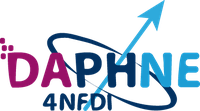Activity log
- Home
- Content providers
- DAPHNE4NFDI
Content provider
DAPHNE4NFDI focuses on research with photons and neutrons at large-scale research facilities. The properties of photons and neutrons allow us to find out where atoms are and how they move - in materials, new materials, thin films, even at very low temperatures or high pressures. This makes it possible to see the tiniest cracks and pores in a turbine blade, find tiny impurities in a semiconductor, determine the position of individual atoms in a protein molecule, and much more.
Photon and neutron research therefore includes a wide range of scientific disciplines. There are more than 5500 scientists across Germany generating a data volume of 28 petabytes per year. The large amount of data presents us with some challenges: The data is often user-specific, a wide variety of software is used for analysis, and data cannot be easily shared. There is also a great need for fast, high-level data analysis. The data should also be stored in a meaningful way and be reusable.
The main goal of DAPHNE is to make data from photon and neutron experiments "FAIR", thereby making scientific work more efficient and gaining more knowledge from the data.
- Improve metadata capture through consistent workflows supported by user-driven online logbooks that are linked to the data collection, thus enabling a richer capture of information about the experiments than is currently possible;
- Establish a community repository of processed data, new reference databases and analysis code for published results, linked, where possible, to raw data sources, to sustainably improve access to research data and enable data and software re-use;
- Develop, curate and deploy user-developed analysis software on facility computing infrastructure so that ordinary users can benefit from and repeat the analysis performed by leading power user groups through common data analysis portals.
The consortium thus aims at a national research data infrastructure along a process chain from the proposal, the experiment, data recorded, stored, analysed and interpreted. This is a very ambitious endeavor. But the consortium already builds on a very strong experience with the IT centres at the large-scale facilities, many activities in data analysis, data catalogues and repositories at the universities and research institutes and the development of metadata standards and quality control. DAPHNE4NDFI wants to bundle all these activities. Hence, DAPHNE4NFDI consortium consists of experts from the photon (KFS) and neutron community (KFN), experts from the different science fields and techniques (diffraction, spectroscopy, imaging, etc.) at universities, research institutes and large scale facilities and strongly interacts among the user and scientists at large scale infrastructures as well as with other NFDI-consortia.
Type
Owner
Activity log

